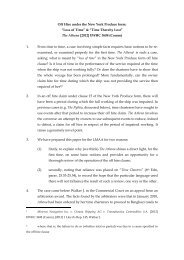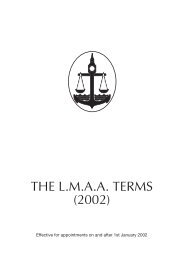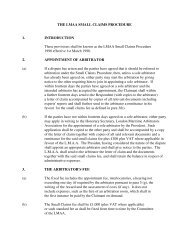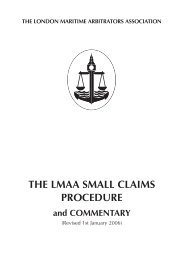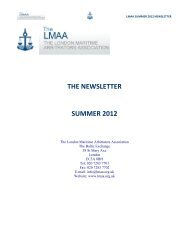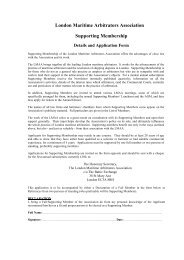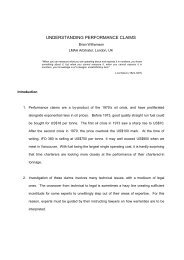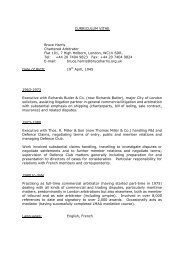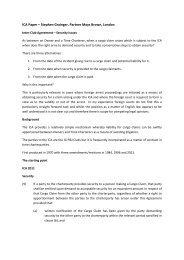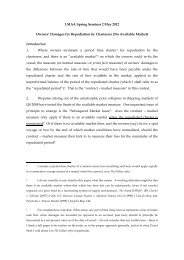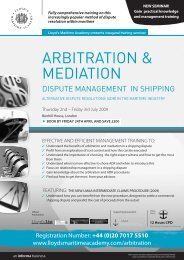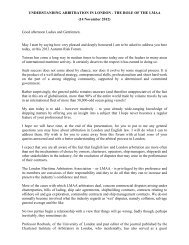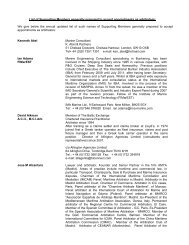Journal Article - LMAA | London Maritime Arbitrators Association
Journal Article - LMAA | London Maritime Arbitrators Association
Journal Article - LMAA | London Maritime Arbitrators Association
Create successful ePaper yourself
Turn your PDF publications into a flip-book with our unique Google optimized e-Paper software.
120 Arbitration<br />
had was often in the background. The parties’ lay representatives communicated directly<br />
with the arbitrators by letter. By and large, everything was relatively simple, quick and very<br />
cheap.<br />
Towards the end of the 1960s, however, lawyers began to be involved more and more.<br />
There were various reasons for this. One was that cases were becoming more complicated<br />
generally. Another was that brokers and agents began to focus more on concluding contracts,<br />
and less on dealing with the disputes that arose afterwards. In addition, P&I Clubs which,<br />
until then, had often handled arbitration submissions for their members, began to employ<br />
outside lawyers more frequently. An inevitable consequence of the involvement of lawyers<br />
was increased procedural complexity. In the first place, lawyers are accustomed to court<br />
procedures and so the informality of arbitration was unfamiliar to them and, as they saw it,<br />
largely undesirable. They attempted to impose the procedures with which they were familiar<br />
from the courts upon commercial arbitration. Lawyers are also naturally cautious and do<br />
not want to risk being criticised for not having done something it might be thought they<br />
should have done. This, too, means that they tend to indulge in procedural arguments which<br />
might otherwise not have occurred.<br />
Thus the practice of maritime arbitration itself became more complex and, in time, the<br />
nature of those who became appointed as arbitrators changed. More and more people, such<br />
as myself, who had some legal experience (and, in other cases, legal qualifications as well)<br />
started to be appointed. Not only was this thought to be desirable in order to deal with the<br />
increasing procedural complexities, but I believe that the parties’ lawyers—who have a<br />
considerable say in choosing arbitrators—generally felt, and feel, more comfortable with<br />
a tribunal made up of arbitrators who have some legal knowledge and who, thus, are<br />
perceived as being more likely to reach a result that is correct in law rather than what might<br />
be called a “purely commercial” outcome (which lawyers often see as being “arbitrary”).<br />
And so it is that many of today’s maritime arbitrators in <strong>London</strong> have, to a greater or<br />
lesser extent, legal backgrounds and often legal qualifications. Two of our recent past<br />
Presidents were once themselves practising solicitors, and four of them have at some stage<br />
worked with P&I Clubs (which are quasi-legal for these purposes) and are legally qualified.<br />
On the other hand, it has to be said that a very substantial number of our arbitrators continue<br />
to come from the purely commercial or practical world, and that is all to the good.<br />
5. Integrity<br />
In any judicial system, whether it be public or private, integrity is obviously of the highest<br />
importance. <strong>London</strong> maritime arbitrators have an excellent—and I consider wholly<br />
deserved—reputation in this regard.<br />
One of the ways in which integrity is ensured is found in the fact that all arbitration in<br />
England is subject—but only where necessary—to court supervision. I emphasise “only<br />
where necessary” because, as a matter of policy, English law regards arbitration as being<br />
a private, consensual process, and considers that the courts should only intervene in order<br />
to support it and to make sure that nothing goes wrong. The courts are not there to substitute<br />
their own views or decisions for those of arbitrators, save in very rare circumstances.<br />
Our courts may intervene in three main areas. One is in connection with the question<br />
whether an arbitration tribunal in fact has jurisdiction or not. Conceptually, English law<br />
holds that this is a decision that cannot finally be made by the tribunal whose jurisdiction<br />
has been challenged. Having said that, however, our Arbitration Act does allow arbitrators<br />
to make decisions on their own jurisdiction, and those will be final and binding unless<br />
challenged in the courts within a relatively short space of time after a decision is made.<br />
A second area of challenge arises if there is a “serious irregularity” in the conduct of the<br />
arbitration proceedings. I will not go into details here as to what amounts to a “serious<br />
irregularity”. Let me just say that the emphasis is, rightly, on “serious”, and that our Act<br />
contains a list of categories of such irregularity. That list not only emphasises the seriousness<br />
(2011) 77 Arbitration, Issue 1 © 2011 Chartered Institute of <strong>Arbitrators</strong>



